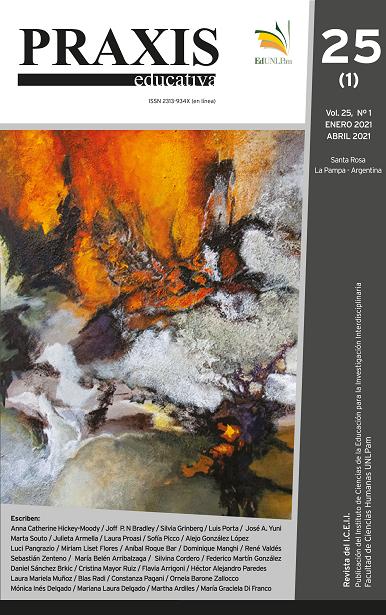The FinEs2 Plan as an educational policy. Variations in the period 2013-2019
Keywords:
Plan FinEs2, education, public policy, narratives, officialAbstract
This article studies the variations in the forms of management of the “Plan de Finalización de los Estudios Secundarios (FinEs2)” based on the analysis of the narratives of the officials in charge of the government during the period 2013-2019. To do so, we start with a doctoral research conducted in the city of La Plata and,
specifically, with the analysis of an empirical corpus built from semi-structured in-depth interviews with officials of this public policy of educational terminality. Finally, we concluded that although the education system presents relative autonomy with respect to the socio-political matrices, it is possible to identify both the continuity of certain definitions on the FinEs2 Plan and other elements that constitute clear ruptures.
Downloads
References
Feldfeber, M. y Gluz, N. (2011). Las políticas educativas en Argentina: herencias de los ‘90, contradicciones y tendencias de “nuevo signo”. Educação & Sociedade, 32(115), 339-356.
Gorostiaga, J. (2012). Las políticas para el nivel secundario en argentina: ¿hacia una educación más igualitaria? Revista Uruguaya de Ciencia Política, 21(1), 141-159.
Jacinto, C. (2010). Elementos para un marco analítico de los dispositivos de inserción laboral de jóvenes y su incidencia en las trayectorias. En Jacinto, C. (Comp.). La construcción de las trayectorias laborales de jóvenes. Políticas, instituciones, dispositivos y subjetividades (15-45). Buenos Aires: Teseo.
Perelmiter, L. (2016). Burocracia plebeya. La trastienda de la asistencia social en el Estado argentino. Buenos Aires: UNSAM Edita.
Pérez, P. y López, E. (2018). ¿Un nuevo ciclo regresivo en Argentina? Mundo del trabajo, conflictos laborales y crisis de hegemonía. La Plata: FaHCE-UNLP.
Rodríguez, L. (1992). La educación de adultos y la construcción de su especificidad. En Puiggrós, A. (dir.), Escuela, democracia y orden (1916-1943) (255-295). Buenos Aires: Galerna
Salerno, A. (2018). “Las que mandan”. Perfiles y trayectorias del alto funcionariado del Ministerio de Desarrollo Social de la ciudad de Buenos Aires durante la gestión PRO (2007-2015) (Tesis de Maestría). Universidad Nacional de San Martín, Buenos Aires.
Shore, C. (2010). La antropología y el estudio de la política pública: reflexiones sobre la ‘formulación’ de las políticas. Revista Antípoda, 10, 21-49.
Shore, C. y Wright, S. (1997). Anthropology of Policy. Critical perspectives on governance and power. New York: Routledge.
Southwell, M. (2009). ¿Particular? ¿Universal?: Escuela media, horizontes y comunidades. Propuesta Educativa, 15(30), 23-35.
Suasnábar, C. (2018). Los ciclos de reforma educativa en América Latina. En Suasnábar, C., Rovelli, L. y Di Piero, E. (Comps). Análisis de Política Educativa. Teorías, enfoques y tendencias recientes en la Argentina (8-36). La Plata: Edulp.
Tedesco, J. C. (1985). Elementos para una sociología del curriculum escolar en la Argentina. En Tedesco, J.C., Braslavsky, C. y Carciofi, R. El proyecto educativo autoritario (1976-1983) (17-73). Buenos Aires: FLACSO
Terigi, F (2008). Los cambios en el formato de la escuela secundaria argentina: por qué son necesarios, por qué son tan difíciles. Propuesta Educativa, 29(17), 63-71.
Downloads
Additional Files
Published
Issue
Section
License
Copyright Notice
Editorial Committee Educational Praxis Magazine:
I hereby declare that I am the author of the article titled (article name), that it is original and my own and that it was not previously published in any other format or medium. I declare to know that the magazine will not charge me any type of fee under any circumstances, nor will I receive any type of monetary compensation If it were accepted for publication in Educational Praxis, I authorize the aforementioned magazine to publish it digitally and to advertise it on its social networks.
If the work is published, I adhere to the Creative Commons license called "Attribution - Non-Commercial Share Alike CC BY-NC-SA", through which it is allowed to copy, reproduce, distribute, publicly communicate the work and generate derivative works, as long as when the original author is cited and acknowledged. This license has been used since September 2018. In 2016 CC BY NC ND 4.0 was adhered to; and in the years 2017 and 2018 (January-August) CC BY NC 4.0.
This CC BY-NC-SA Share Alike license does not, however, permit commercial use of the work. As an author, the journal may establish additional agreements for the non-exclusive distribution of the version of the work published in the journal, it allows me to self-archive the published articles, in their post-print version, in institutional, thematic repositories, personal web pages or any other relevant use. with the recognition of having been first published in this journal.
Educational Praxis adheres to DORA (Declaration on Research Assessment) signed in San Francisco, California, on December 16, 2012, and to the Declaration of Mexico (Joint Declaration LATINDEX - REDALYC - CLACSO - IBICT).











_(1)2.png)


3.png)











_(2).png)






2.jpg)









